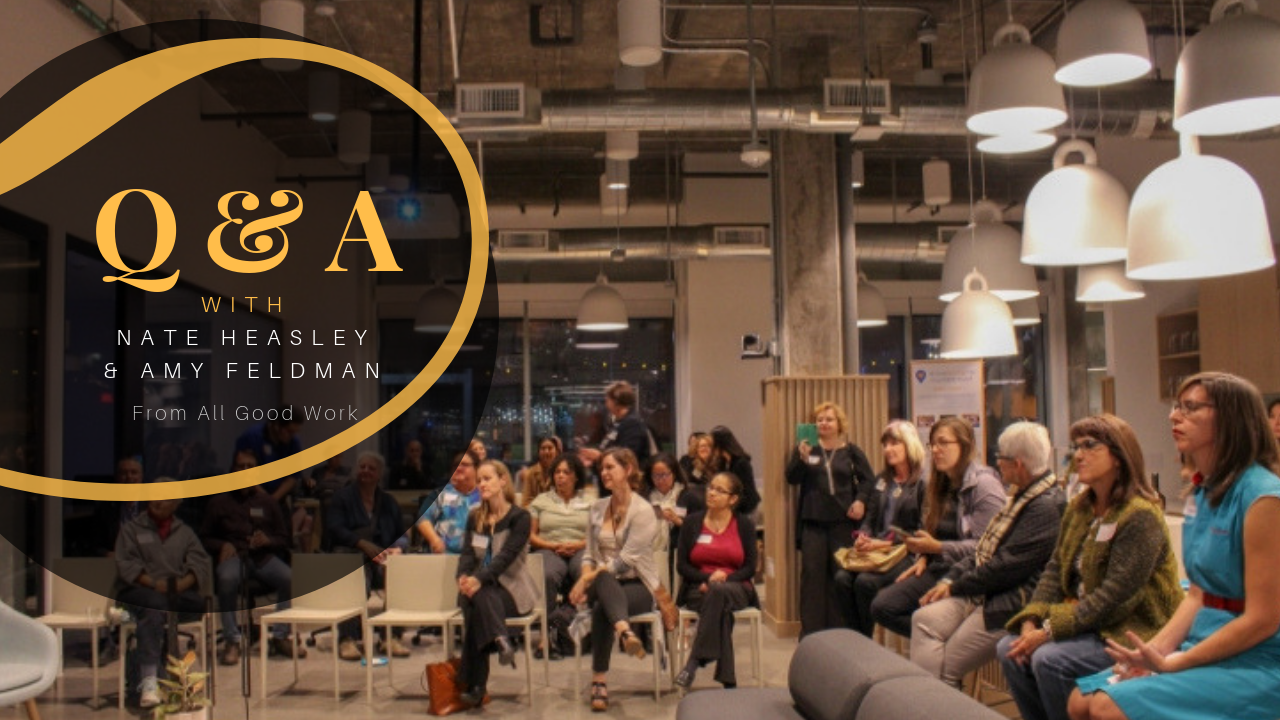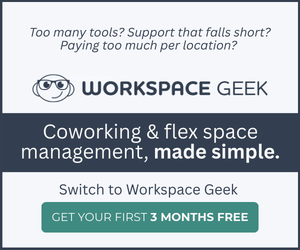One of the standout social good initiatives in the workspace industry, All Good Work connects spaces with room to spare with nonprofits and community organizations. The foundation recently expanded from New York to Silicon Valley and the team is eyeing two more cities in the next year.
Allwork.Space spoke with All Good Work executive director Nate Heasley and Silicon Valley program director Amy Feldman about the impact All Good Work is already having on Silicon Valley organizations and the vision to work with more community-based organizations moving forward. Here are the highlights of our conversation.
Allwork.Space: How is All Good Work Silicon Valley different from All Good Work New York City?
Amy Feldman: The biggest issue that differentiates the two—because the program is essentially the same—is that geography really matters here because of the challenges people have with traffic; especially during rush hour. Every single person I’ve spoken with on the nonprofit side is looking for space that is really easily accessible, that doesn’t force them into the morning commute chaos. They want to take a local street, get to their space, and walk into work ready to take on the world instead of frustrated.
New York has such a robust transit system, between buses and trains, biking and walking, and it’s a much more geographically condensed. It can take an hour and a half to go 14 miles during rush hour here.
Nate Heasley: That’s one of the interesting things about our distributed model that may work better in Silicon Valley than it does in New York. New Yorkers don’t like to take crosstown buses, and if they can shorten their commute they’ll happily do that. But Amy’s right about the transportation in New York, so for New Yorkers, the geography might not be so pressing. So having the Impact HUB or Center for Social Innovation is a little bit easier in New York, and people will go there. Our distributed model shortens commutes for people in both places, but it’s even more so in Silicon Valley.
Allwork.Space: When you talk about All Good Work being a distributed model, are you referring to the fact that there are a number of spaces people within an organization can choose from?
NH: Exactly. There are 15 centers in Silicon Valley and 40 in New York, so people can choose the location that works best for them and that shortens their commute.
Allwork.Space: I’m curious if you see any differences between the participating organizations in the two different areas.
NH: We don’t have a huge number of organizations placed in Silicon Valley yet. Of the applications coming in and the ones we have placed, I don’t see any significant difference.
We don’t specialize in any particular kind of organization. What we’re evolving into, however, is working more with community organizations in both Silicon Valley and New York. I think that will be reflected more in Silicon Valley—that the nature of the organizations will be more community focused, where in New York more organizations will be nationally focused.
Allwork.Space: How is All Good Work being received by coworking space operators in Silicon Valley?
AF: I’ve had a brilliantly wonderful experience connecting with the coworking space operators. Not every space has signed on, but those that didn’t certainly weren’t against the concept—everyone thinks the concept is brilliant. Some spaces are more challenged because they’re tiny or it’s just not the right timing for them.
The reason we were able to secure so many sites relatively quickly is because they really do get it. It’s almost entrepreneur-to-entrepreneur giving back. They understand the bootstrapping and that, whether it’s a social enterprise or nonprofit, social impact organizations are struggling with a lot of the same issues as owners of independent coworking spaces. They support each other and the ecosystem of the coworking space is a natural fit for a social impact organization.
Allwork.Space: Can you give me an example of an organization involved in All Good Work Silicon Valley and how the project helps them?
AF: For example, Veggielution is sharing their chair. It’s a unique situation with them where different members of their staff use the chair on different days. One of the things that was significant for Cayce Hill, who is the executive director, is that we make the assumption that everyone can work from home as an option, and that is actually not always the case.
All Good Work is democratizing her own staff’s ability to work effectively in a professional environment because some of these folks may not have the quiet space they need to work at home. She does, but not everyone on her team does. And not everyone has high speed internet access in their home. Also, just having an opportunity to work in an office environment and interact with people they haven’t met before on a professional level is raising the bar on the professional skills of her own team. She’s thrilled about that.
Allwork.Space: It’s been a while since we’ve spoken, Nate. I’d love a check-in about the big picture vision for All Good Work? How are things going and what are your working on?
NH: We’ve been focused on the Silicon Valley launch, but New York is doing well too. We’ve got some great new organizations and spaces there so we’re going to be expanding there, as well. Our thoughts right now are about where to go next and what to do next. We’re in talks with folks in Miami and LA—both of those are possible next locations for us. And we’re looking at San Francisco and the East Bay to see if we can find a way to get them, as well as Silicon Valley, covered. We’re hoping to expand to two more cities in the next year or so.
We’re also working on All Good Coffee. We’re really just creeping into it right now, but our hope is that it will be a major source of support for the foundation itself. We’re talking to some big clients that may turn into significant amounts of revenue. Overall, the forecast is for All Good Work to be in a solid position in 2019 and able to expand, as well.
Allwork.Space: Thanks Amy and Nate. Is there anything you’d like to add?
NH: The program hasn’t really changed, we’re just expanding the geography but we’re pretty much doing the same thing we’ve always been doing.
AF: If there are other coworking spaces in Silicon Valley—in Santa Clara and San Mateo Counties—that would like to get on-board, we would love that.
NH: Or in New York.
AMY: We’re ready.

















